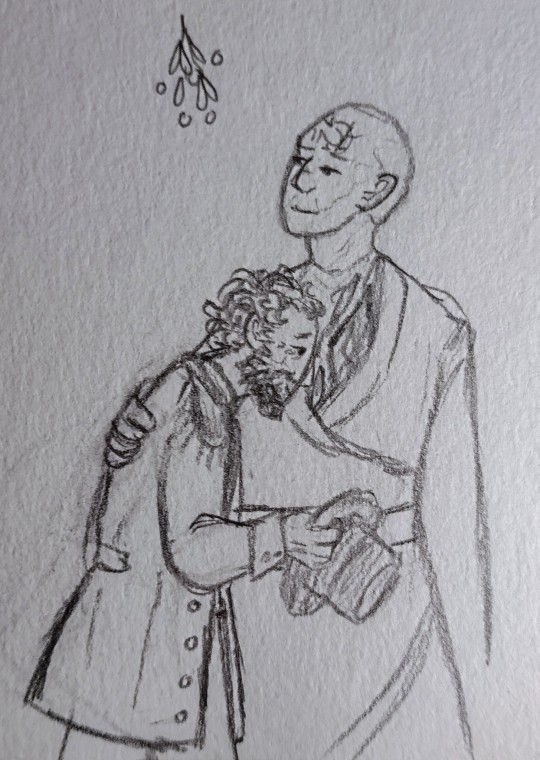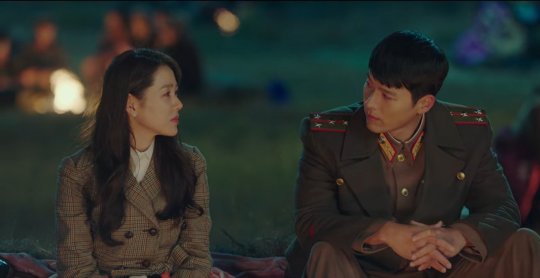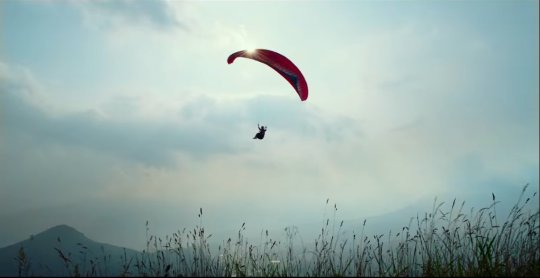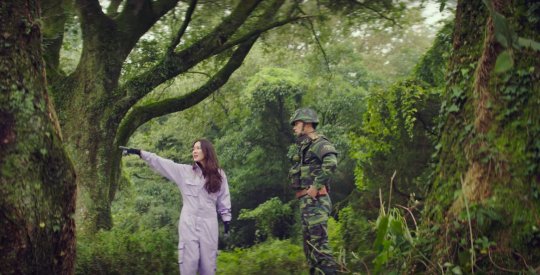#i am also incredibly unwell about these men hi!!! (has read three different translations of gilgamesh specifically because of these bastards
Note
Number 6 with the Manager and the King with a Hundred Hearts…. i am mentally unwell about them 24/7

Oh, my heart. Oh, his heart. Oh, all our hearts.
#i am also incredibly unwell about these men hi!!! (has read three different translations of gilgamesh specifically because of these bastards#just. them!!! augh!!!#anyways fun little detail. i had the king cross his robe right over left here bc thats the way its done for corpses#and he thinks he should be dead. but he cant be! so its a nod to that. a visual recognition of sorts#art#the scientist scribbles#ask#the manager#the king with a hundred hearts
27 notes
·
View notes
Photo



My favourite thing this year has been the Korean drama Crash Landing on You (2019-20).
It has something of a ridiculous title (I’ve ended up calling it Crash Landing or sometimes just Crash). But, to be fair, North and South was already taken.
“I can go to Africa and even Antarctica but not here. It’s a shame that you live here.”
“It’s a shame that you live there.”
-- episode three
To my great amusement, every month or so, Netflix has sent me an email that’s said: “Don’t forget to finish Crash Landing on You” or “Remember this? Watch it again: Crash Landing on You” or “Rewatch your favourite moments - Watch it again: Crash Landing on You…”
And I’m like: NETFLIX! Seriously, WHAT do you THINK I’M DOING?
I have now watched Crash Landing on You five times.
There are several reasons for this:
I successfully dragged other family members down this particular rabbit hole, and in a pandemic season, when things have been unpredictable (or cancelled), rewatching Crash Landing has been an appealing and comfortably-familiar distraction, as well as the source of many, many long, analytical fandom-y conversations, which has been fun.
I needed to watch it more than once to straighten out all the pieces of the story in my head. With 16 episodes, each over an hour long, it’s one of the longest stories I’ve ever watched. I’ve seen other TV series with more episodes, but nearly all have been much more episodic, rather than telling one continuous story.
I kept noticing details that I’d previously missed because I’d been focused on the subtitles or that I hadn’t properly understood some cultural nuance. And some things are ambiguous in translation -- in a good way, a fodder-for-discussion way.
I have ALWAYS rewatched (or reread) my favourite stories. And Crash Landing fits right in with those. Someone in my family described it as: “Like Lord of the Rings on steroids!” However, I think it actually has far more in common -- visually and thematically, and also in terms of my willingness to discuss the characters as if they were real people -- with my favourite historical dramas.
In terms of story, Crash Landing is easy enough to summarise: A South Korean businesswoman is paragliding when a freak storm blows her across the border; she’s discovered by a North Korean captain, who hides her and helps her get home.
But I’m going to need more words to explain why I fell in love with it.
It is fascinating and, first time round, tense and unpredictable. It’s funny and very meta -- very aware of the tropes it’s playing with and of parallels and contrasts within the story. It’s visually and aesthetically pleasing, and the soundtrack grew on me.
There are a number of coincidences and a few ridiculous fight scenes, but the emotions are intensely real and so are the consequences. It has camaraderie and found-family and thoughtfully-complicated family relationships. There are characters I love, and characters who surprised me, and so much time given to character development! It’s romantic. There’s a fake engagement (a favourite trope of mine) and while I’m not a fan of love triangles, I liked how this quadrangle-tangle is handled. And the obstacles to the romance are satisfyingly realistic; characters have sensible reasons for the choices they make.
I love how the story uses flashbacks, particularly the post-credit scenes.
The final episode isn’t perfect, but given that a perfectly happy ending would, realistically, require the reunification of north and south, I thought it came very close.
Let me elaborate.
Cut for sheer verbosity, rather than spoilers. (I’m not allowing myself to list spoiler-ish examples or dive into analysing my favourite scenes, because then I wouldn’t just be here all night, I’d be here all week).
⬦ Fascinating, tense, unpredictable: I knew almost nothing about life in North Korea, so that was fascinating and made the story harder to predict, as I couldn’t anticipate what options the characters had or what obstacles might arise. And that isn’t the only reason I found it tense -- at different times, different characters are greatly at risk if discovered; there are occasions when characters are in danger of physical violence or are injured; and they have a couple of dilemmas to which there are just not easy solutions (See also: Obstacles for romance).
While I’m on the subject of the setting, although I cannot judge how accurate this portrayal of the north was, it’s portrayal of people as people was incredibly convincing. It’s a society where people have differences in personality and in circumstances. There are orphans begging in the market, people who can afford to stay in fancy hotels -- and a lot of people somewhere in between. In the military village, people have varying attitudes, tastes in clothes, privileges, standards of living, etc. Their lifestyle differs from that in Pyongyang, and also in other parts of the country. Amongst the military, some men are compassionate, some are corrupt and some are not obviously one or the other.
Moreover, it’s clear that corruption and villainy isn’t just in the north. In the south, as in the north, we see a range of humanity -- selfishness, good friends, complicated families, happy marriages, criminal behaviour, and so on.
I’ve read an article or two suggesting that the least realistic aspect is Ri Jeong Hyeok being such a sympathetic and honourable officer. I think it’s interesting that he clearly isn’t a typical captain -- he wanted a different career, he’s spent time studying overseas (in a democratic country), and, perhaps most importantly, his father’s position gives him protection from pressures many others face. He has the privilege of being able to afford to act with integrity, and of encouraging such behaviour in the men he leads.
⬦ Humour and meta: I’ve included these two together, because so much of the story’s self-awareness and intertextuality is humorous. I am very amused by so many things -- the village women’s interactions, Se-ri’s wit and banter, Jeong Hyeok’s facial expressions, the duckling's reactions, the way Ju Meok keeps comparing things to South Korean dramas:
Ju Meok: “I haven’t seen any drama characters that don’t fall in love in that situation. That’s how they all fall in love.”
(Because my knowledge of Korean drama is limited, there are a few cameos and references which I suspect would be amusing if one was in the know. The exception is the taxi driver singing, who was funny even without recognising the actor.)
I love the commentary that comes from all the moments when other characters witness the unfolding romance. Others’ reactions are often memorably hilarious -- some of my favouritest scenes fall into this category. (The customs officer! Jeong Hyeok’s dad!) They introduce humour and self-awareness into these moments, allowing the story to acknowledge “Yeah, we know these two are being ridiculous/sappy/emotional”. These moments reveal people’s attitudes towards displays of affection, particularly in the north, and their different attitudes towards Se-ri and Jeong Hyeok’s relationship.
And as their relationship changes, Se-ri and Jeong Hyeok’s awareness of being watched and commented upon changes, too.
Which leads me to…
⬦ Contrasts and parallels: So many scenes which echo/parallel earlier scenes. Most obviously, this allows the story to compare and contrast the north and south, but it also shows changes in time, differences between characters, and differences in relationships too. Sometimes all at once!
It means some plot developments weren’t totally unexpected -- it was Oh, of COURSE, we’re going to now see that character in this situation! or OBVIOUSLY we now have to see what this is like in the south!
But I thought it was really effective storytelling and I so much enjoyed spotting and analysing these moments.
⬦ Yoon Se-ri and Ri Jeong Hyeok: These two are the heart of the story and there are so many things I love about them. Like how, even though Se-ri is dependent upon Jeong Hyeok to hide and help her -- even though they’re initially hesitant about a romantic relationship -- they quickly become very protective of each other. Often to the point of willingly risking their own safety. Often to the point of exasperating the other. It’s great.
That’s not the only thing they discover they have in common. They share some interests. They’re both highly intelligent, driven, successful leaders (he’s a captain, she’s a CEO) who are very private, lonely people carrying around grief about their family and their past. Neither of them likes to reveal their emotions -- he tries to conceal his by suppressing his facial expressions and avoiding answering questions, while Se-ri hides behind play-acting.
I like watching Se-ri trying to get to know Jeong Hyeok. She isn’t deterred by his silences (unlike someone else) and she keeps the conversation going even when he doesn’t respond. She watches him closely, and says or does things to provoke a reaction. Poke, poke, poke.
And the time they spend together is really revealing. They share meals, they share a house. They see how the other responds under pressure, but also in various social and domestic situations. They see each other in a range of moods: calm, happy, grumpy, scared, tired, upset, unwell. Crash Landing takes advantage of spending sixteen episodes with these characters. Going through so many different experiences together, they learn a lot about each other -- about each other’s values, tastes and temperament -- and this means the audience gets a deeper, more nuanced understanding of who they are, too.
Se-ri and Jeong Hyeok are also well-matched in how they show they appreciate each other -- she delights in giving presents, and he is quick to notice things Se-ri might need or like.
And it’s very satisfying when they open up, or when they cry in front of each other, because you know that they don’t do this lightly or easily.
⬦ Obstacles for romance, love triangle quadrangle-tangle: I appreciate that the obstacles in this story are not contrived or fueled by needless misunderstandings. Se-ri and Jeong Hyeok have really solid, sensible reasons to be hesitant to first recognise, then admit to, and then act upon, a romantic attraction. Even once they realise that getting Se-ri home is going to take longer than they’d hoped and she’s pretending to be Jeong Hyeok’s fiancée, romance between them is still a road that leads nowhere. She isn’t safe staying in the north and he would endanger his family if he defected to the south, and they both accept that. And they’re reticent about sharing vulnerable feelings, and Jeong Hyeok is actually engaged to someone else.
But once they really open up to each other, the narrative conflict revolves around their circumstances, rather than doubts or misunderstandings they have about each other. Because the situations they face are dangerous and difficult, with no obvious or straightforward path to a happy ending, there’s quite enough tension to drive the story forward. They still have a couple of misunderstandings, but I like how they handle those, and I like that they don’t have more of them.
As for the love triangle, it doesn’t have the angst of someone torn between, or even attracted to, two people. Jeong Hyeok’s engagement has been arranged. Having feelings for someone else doesn’t change the foundation of that engagement, nor the pressure to please his family. He doesn’t love or know his fiancée -- not well enough to risk revealing Se-ri’s true identity to her. He’s honest with Se-ri and he makes an effort with Dan.
(I have a theory that, if he had been in love before, he might be quicker to recognise how some of his behaviour towards Se-ri fosters intimacy and sends her messages he doesn’t intend, but this is all new for him.)
He tries not to mislead or hurt Dan, but she’s hurt nonetheless, and I like that Crash Landing doesn’t gloss over that. It explores why she’s hurt, why she’s so reluctant to let him go and why their relationship never really worked. (Neither of them are good at communicating with each other, and I think she takes some of the things he does for her for granted, rather than recognising them as overtures and as opportunities to get to know him better.)
Dan is not just a romantic rival, nor a narrative complication, but a person whose concerns and desire are taken seriously, and who is given space to grow.
Which leads me to...
⬦ Surprising characters, thoughtfully-complicated family relationships: As mentioned, Crash Landing takes advantage of the amount of character development 16 episodes allows, and not just for its lead couple. I was surprised by how much my opinion of certain characters changed, as I came to understand them better.
The character I was most surprised by was Gu Seung-jun.
Each time I’ve watched this, I’ve liked Dan more. I have a lot of sympathy for her now. I also like her mother, even though she’s embarrassingly over the top, because she cares fiercely about her daughter and about advocating for her.
Se-ri’s dysfunctional family are more nuanced than I expected, too. In particular, I love the attention the story gives to Se-ri’s relationship with her step-mother. I was expecting Se-ri’s father to play a larger role, perhaps because he’s nominally the one with the power and influence, and at first Se-ri’s mother seems so passive. But it was really interesting to understand where she’s coming from, why her relationship with Se-ri is broken and sad. The steps the two of them take towards rebuilding their relationship are believable.
(On a related thought, I appreciate a lot of the choices this makes in addressing these women’s mental health struggles. One or two moments arguably could have been handled better, but on the whole it’s realistically optimistic, with enough detail so that we understand the seriousness -- the impact it’s had on these women’s lives.)
⬦ Camaraderie, found family and the ducklings: Se-ri doesn’t spend as much time with the village women as she does with Jeong Hyeok and his soldiers, and when she does, she’s play-acting, in order to keep her identity a secret. But I like how they nevertheless support her, and how meeting her sparks change their dynamic with each other. They grow closer and become much better at supporting each other. It’s really heartwarming.
We gave many of the characters codenames, so we could discuss them when we were still learning their names. (I was surprised by how long it took me to learn some of the characters’ names. Because so many were unfamiliar to me, they were harder to remember; I wasn’t always sure, from just reading the subtitles, how all of them were pronounced, and sometimes it was hard to separate the sound of the names from surrounding sentences, especially when, due to honorifics and titles and so on, subtitles don’t always match exactly what is being said.) Jeong Hyeok’s men are “the ducklings”, inspired by something I saw on Tumblr: Gwang Beom is “Handsome Duckling”, Ju Meok is “Drama Duckling” and Chi Su is just the sergeant.) I love how they function as a found-family, especially in contrast to Se-ri’s real family. They’re funny, loyal and caring, and in spite of their different personalities, work well together as a team. I enjoyed seeing the different relationships they have with each other, with Jeong Hyeok and Se-ri, and how some of those relationships change. And they’re so protective they are of Eun Dong!
Man Bok has an interesting arc -- I could have mentioned him under Surprising characters. I really like how he fits into this story, how he’s connected to the mystery Jeong Hyeok is investigating, how he becomes involved with the rest of the characters and has these moments when he plays a significant role. Or gets to be funny. I like the contrast and parallels too -- he’s in a different place in his life to the ducklings, and he gets opportunities to revisit past choices he regrets.
And I’m trying not to write essays about all the characters, and it’s ahhh, I have too many thoughts and feelings about them all!
⬦ Satisfyingly realistic: I like how -- one or two ridiculous fight scenes and an unrealistic paragliding scene aside -- things which happen have believable consequences. Particularly emotionally. We see men cry! A lot! And it always feels like a genuine expression of emotion, not gratuitous or overwrought. (Well, okay, there’s a very minor character who’s a bit over the top but he’s very minor.)
When one of the characters is gravely ill, she looks it, I found it oddly satisfying that she doesn’t have to be pretty all the time.
And I wasn’t sure if this belonged here or under “Visual details” but I love the attention given to Se-ri’s clothes. She cares a lot about fashion and in the north her clothing choices indicate that she cares a lot about her appearance, while making do with a limited wardrobe and still dressing for warmth. (I’m happy to handwave that she seems to have more clothes than would realistically fit in those shopping bags.) I appreciated the practical streak, and, as winter wore on here, became envious of one of her outfits.
I don’t personally like the style of Se-ri chooses for work, but it’s different it is from what she wore in the north and from what she wears at home -- her power-dressing is like a uniform or a statement of persona she projects in her working life, and not necessarily a reflection of her personal tastes.
⬦ Visual details: I love so many of the visuals. Gorgeous scenery, interesting settings and clever framing for significant scenes. The sky, a place without borders, often becomes a focus and there’s a thematically-relevant flight motif -- paragliders, birds and kites.
I did not start noticing the product placement until a rewatch, when I stopped to think about how often they went to Subway. The first time, it just seemed like a commentary on south-versus-north, and then I was just baffled-yet-amused by it all. (That sort of thing does not make me want to eat fried chicken...)
⬦ Soundtrack: The first time round, I liked the instrumental score and the presence of piano music actually in the story. As I kept rewatching, the rest of the soundtrack slowly but steadily grew on me, and I found myself liking the songs more and more.
Now I not only recognise them by name, I can recall most of them well enough to hum them and know which scenes they’re associated with. Which is a lot harder when the lyrics are in a language I don’t speak and so I can’t use them as a prompt for memory.
⬦ Flashbacks: Instead of “previously-on” segments, Crash Landing employs lots of flashbacks whenever it wants to remind the audience of something.
Sometimes, instead of just repeating part of an earlier scene, it takes the opportunity to show the same moment from different angles or from a different character’s perspective, or to juxtapose it with a different scene or to introduce new information. This was really effective. And when flashbacks were a simple repeat, I was usually happy to revisit important moments in the story (and sometimes, having a different person translating the subtitles meant there was a slightly different perspective on the dialogue).
Then there are the post-credit flashbacks, quite a few of which take places years earlier. I love how they’re puzzle pieces about the characters’ pasts and the connections between them.
⬦ The end: The first time round, after watching the penultimate episode I was so engrossed in the story and so invested in the characters that I had trouble sleeping and I went around the next day with this tight, anxious feeling, unable to get the story out of my head.
The final episode is an emotional rollercoaster. SO. MANY. FEELINGS. There’s one particular scene which packs a powerful punch -- it’s exceptionally emotional and beautifully filmed. I love it, but I’m glad we get the aftermath too.
It isn’t a perfect ending, but as I said, I don’t think there was a perfect ending was possible, not one that was both realistic and satisfying. But this comes very close. In the very final scenes, not everything is resolved or explained, and I like how that ambiguity is open to interpretation -- I like that there are some gaps for the viewer to fill in for oneself, however one prefers to imagine the characters’ lives going forward.
I know I could easily write another four thousand words about this story -- there are aspects I haven’t really discussed but this seems like a good place to stop. For now.
I really like this story. I expect I’ll watch it all again soon.
53 notes
·
View notes